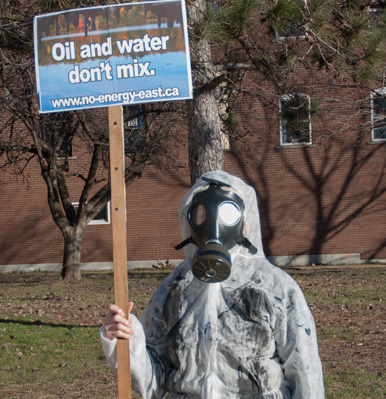Women sing watersong at town hall event against Energy East Pipeline
 By Kelly Anne Smith
By Kelly Anne Smith
NORTH BAY – First Nations women from Nipissing First Nation and North Bay led an event to protect the water.
Maude Barlow of the Council of Canadians was in North Bay to meet with people wary of an aged pipeline being converted to contain dilbit, an oilsand product. Barlow is a former senior adviser on water to the United Nations. A new report was presented called When Oil Meets Water: How the Energy East pipeline threatens North Bay watersheds.
Elder Lorraine Whiteduck-Liberty sang the Water Song with Sara-Vi Lerouz and Dolores Chum from Nipissing First Nation. Tasheena Sarazin and Laura Liberty also sang the Water Song that Whiteduck-Liberty of the Loon Clan says is important for everyone to sing.
Whiteduck-Liberty told those crowded into St. Andrew’s United Church that a Sault Ste. Marie grandmother Dorene Day wrote the Water Song. “She and her grandson were crossing the bridge at Sault Ste. Marie in order to go to school every day. The song is in the language. It says, “Water, I thank you. Water, I love you. Water, I respect you.” It is sung like a lullaby. As women, it is the Anishinaabe way to look at the water as life giving. We honour it in that way.”
Dolores Chum says singing the universal Water Song is so important. “It is our way of blessing the water to make sure no harm comes to it. We want everyone to be aware of why we are singing tonight. The water does have a spirit and we must be respectful to it. We have to open everybody’s eyes. All the animals and plants don’t have a voice. We do.”
Chum says everyone can help. “Every morning when I have a glass of water, my six cups, I pray to the water. I am grateful that it is here. Our body is mostly water and we need it. Everything needs it.”
Charles Hookimaw, originally from Attawapiskat was at the townhall meeting to have a better understanding of the Energy East Project. “I am concerned that they are going to use a line that is already in existence. It is unreliable and unsafe. It is an environmental concern with the huge watershed.” Critics of the proposed Energy East pipeline question the environmental risk and now a Wall Street research firm says peak oil is here in 2030 with the need for the oil in decline afterwards. TransCanada’s leak-detection system is designed to detect high-volume spills but it has reported that its sensors are not able to detect leaks beneath 1.5% to 2% of the pipe’s flow rate.
During the question and answer period after keynote speakers, people voiced concerns about the local groundwater, private wells and waterways.
Dolores Chum will continue working for the water for future generations. “I want to make sure the water is here for the grandchildren. I am worried thinking about what would happen if there is an oil spill.”
Steve Courtney showed Theia Geoanalytic’s video of a bird’s eye view of the pipeline in Ontario, pointing out the many major water crossings. The video that followed was hard for Dolores Chum to watch.
“I had to hold back the tears,” said Chum after watching Courtney’s simulation of The Trout Lake Watershed being contaminated after a pipeline breach.
Laura Liberty explained why she thinks it is important to fight for water. “It is about standing together, all Nations, to ensure that we continue to have clean drinking water.”
Liberty also addressed the over 250 people attending. “The song is to be sung by all nations. Sing it as much as you can.”
The Water Women continue to help others connect with water.
Lorraine Whiteduck-Liberty will be an attending Grandmother at the Anishinabedkwewag Grass Roots Gathering 2016: Connecting to the water. It starts Friday, May 27th at the North Bay Indian Friendship Centre with weekend events to be held at Big Medicine Studio. Participants are asked to bring skirts, sweat gowns and towels, and a Dewehgan (drum) or Zhiishiigwan (shaker).

